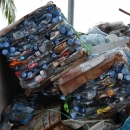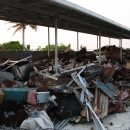Grants :: Small Grant Facilities :: Environmental Awareness Media Project
Environmental Awareness Media Project

Haa Hoarafushi , Haa Hoarafushi © Lhi, 2010
Objectives
1. To create environmental consciousness among the people of all ages
2.To bring to the attention of decision makers the environmental issues that concerns people
3.To share success stories from various island communities and to motivate others to undertake similar activities.
Background
Human impact threatens our sensitive coastal and marine ecosystems with the possibility of catastrophic collapse of certain important mangrove and coral reef ecosystems. Collective human consciousness, responsibility and action are urgently needed to ensure that future generations will inherit a healthy environment. Irresponsible behavior such as littering, dumping of waste, intentional destruction of mangrove trees, reclamation of mangrove areas, negligent fisheries actions are often related to ignorance, short sightedness and lack of awareness on the importance of such habitats. Furthermore, activities relating to the protection of the environment often lack recognition and appreciation.
The Environmental Awareness Media Project (EAMP) is aimed at addressing the environmental issues and proposing solutions and giving due recognition to those activities by NGOs and other groups at local and national level. The project will aim to make as many people as possible to participate in the Programmes to make the impacts felt as large audience as possible.
Target beneficiaries
The project aimed to cover the whole of Maldives. Radio is a common and most available mean of communication especially in the island communities. DHi FM Radio Station through which the project was aired, is one of most listen to radio station in the country.
Outputs
1. Audio visual weekly magazine show for a period of six months each show lasting 60 minutes live from the audio visual studio with the following segments. The show was aired on Saturdays to enable maximum participation of the school students as well as adults. Each show consisted of the following segments.
- e-weekly local news- segment containing a brief report about (2 min) covering the most important environmental issue of the week in the country
- e-sounds – local people voicing environmental concerns that affects them with reaction from relevant government organizations
- e-quiz segment interactive quiz segment
- e spots awareness (messages) spots aired 3 times during each programme giving important messages
- e-global – this segment covers for about two minutes environmental happenings around the world
A total of 24 shows were aired during the course of the project.
2. Production of five original environmental video songs with subtitles in English
- lyrics for all 5 songs completed
- Recordings of 5 songs completed
- Videos of 5 songs done
- Subtitling of 5 songs completed
3. Production of 3 (three) video environmental spots completed. Each spot has a clear message on environment to the viewer.
4. Short term attachment of a radio journalist with an environmental organization.
Accomplishments and challenges
Accomplishments:
There was a strong response to the radio shows and video spots from the general public. Further, the materials produced by the project are not copyrighted and so available to other broadcasters, NGOs and schools free of charge. The songs and video spots are expected to be broadcast widely on both radio and television.
The materials are also frequently used by school environmental clubs, environmental NGOs, and Scouts and Girl Guides groups during their activities.
Station managers expect the environmental messages in the songs, videos and radio spots to continue to reach audiences for a long time to come. They also expect that, with 17 shows produced and a journalist trained, the radio station will be more sensitive to environmental issues and pay more attention to environmental issues in its daily news coverage.
Challenges:
The project originally planned to nominate and second a journalist from DhiFM to an environmental organization in the region to expose them to environmental issues and challenges. In the end, it proved unfeasible for a short project to arrange an overseas attachment. In consultation with UNDP, it was eventually decided to place a journalist with the Atoll Ecosystems Conservation (AEC) Project in Baa Atoll. With support from AEC experts, a DhiFM journalist spent ten days travelling among islands in the Baa Atoll to learn about the environmental challenges faced by local communities, conduct interviews and collect audio and video materials for broadcasting.
Contributions to cross-cutting themes
Communications
The project produced awareness materials in the local language and disseminated them to all target households in the island.
Lessons Learned
Documenting every event during the project would help to capture learning and identify challenges.
Project Facts
Country
Location
Male', Maldives
Topic
Duration
1st Oct 2009 to 31st Mar 2010
MFF Grant Amount
US$ 34,890
Co-financing Partner
Maldives Media Corporation made an in-kind contribution of US$ 10,000.
Implementing Partner
Mr. Hassan Maumoon
Ms. Aminath Reesha
DhiFM Radio Station
Maldives Media Company Pvt. Ltd,
Malé, Maldives 20129
Tel: +960 334 5556
Fax: +960 334 5559


